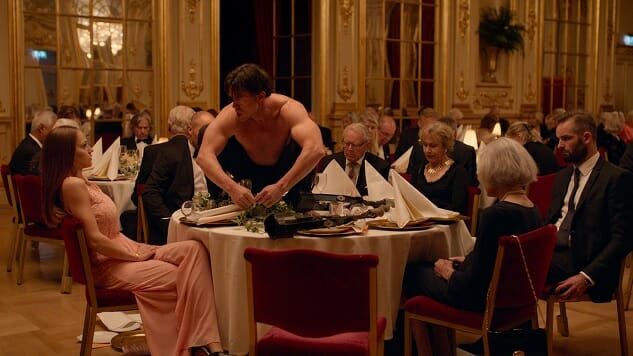The Square

The Square starts with a hangover and ends with a headache, but don’t feel too bad for the well-meaning fool suffering from them. His ailments are entirely his own damn fault. This is what happens when you try to shoulder the combined weight of the world’s problems by yourself without shrugging: You buckle. In the case of our well-meaning fool, Christian (Claes Bang), that burden is made heavier by hubris, pomp, the kind of commodifiable liberal arrogance that dupes people into thinking they’re helping by responding to mass shootings and natural disasters with hashtags. Christian’s intentions are good—grand even—but he’s just one person. One person can’t wash away humanity’s woes, especially when that person is an inveterate asshole.
In Christian’s defense, “asshole” is a multifaceted term. He doesn’t live up to its worst definition, but it remains a matter of observable fact that he’s a pretty crummy example of manliness. If you know the movies of Ruben Östlund, though, this won’t come as a surprise: Crummy examples of manliness are his bread and butter. Östlund’s last movie, 2014’s superb Force Majeure, a biting satire of disgraced masculinity, is all about dissecting gender roles and finding sympathy for its protagonist following an act of humiliating cowardice. The Square explores similar thematic pursuits but couches them in an equally biting satire of the art world, and if you’re taking the mickey out of the art world, you’re taking the mickey out of the world at large. Art, after all, is innately political, and The Square has politics in its DNA.
Quite unlike the laser-focused Force Majeure, The Square sprawls. Östlund lets the film unfold slowly and methodically, and as it unfolds it reveals the best and worst sides of its backdrop, Stockholm, a beautiful city increasingly encumbered by homelessness. The issue isn’t that Stockholm’s homeless population has grown, but rather that as it has grown, better-off folks have decided that ignoring the downtrodden is preferable to aiding them. One of those better-off folks is Christian, a smug bourgeois art museum curator, who in each of his encounters with the homeless routinely turns them away or disregards them. It just so happens, and more than once, that Christian ends up on the other side of destitution, notably around The Square’s ten minute mark, when a pair of grifters relieve him of his phone, wallet and cufflinks without him realizing it. Östlund’s camera slowly zooms in on his hero as he obliviously beseeches passerby for assistance. “Could you please help me? Could I please borrow your phone?”
You can sense Östlund’s wicked smirk from the other side of the lens. Christian’s predicaments serve him right, or they would if he bothered learning from them at a greater than glacial speed. Chiefly, The Square focuses on his efforts to open a new highfalutin installation piece at the museum, titled “The Square,” which Christian describes with excessive pomp and pride: “‘The Square’ is a sanctuary of trust and caring. Within its boundaries, we all share equal rights and obligations.” It’s a nice idea, and one he doesn’t bother living up to when he isn’t busy schmoozing with the museum’s wealthy patrons. Christian is at his most humanitarian when he has the spotlight, which is probably true for the majority of Östlund’s audience. We talk a good, compassionate talk, but God forbid we keep spare change on us to help a beggar out.
-

-

-

-

-

-

-

-

-

-

-

-

-

-

-

-

-

-

-

-

-

-

-

-

-

-

-

-

-

-

-

-

-

-

-

-

-

-

-

-








































